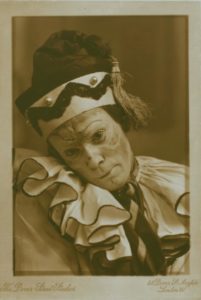At the age of eight, in a school with only 70 students, in a small village in the middle of Lincolnshire, a county not famous for much (except Sir Isaac Newton), and in a classroom with a view of a field of sheep (whose wool made the area wealthy in the the late middle ages), I was introduced to the music of the revolutionary Russian composer Igor Stravinsky.
Every week we watched a BBC programme for schoolchildren, which took the form of a puppet version of Stravinsky’s ballet Petrushka, using the stop-motion technique later to be made famous by Academy Award winner Aardman’ Animation’s Wallace and Gromit and Shaun the Sheep (which I once saw playing on the Beijing subway train). I don’t know what mad genius thought of introducing English schoolchildren to a ballet that is hardly a household name even now, rather than picking a much less interesting, safe choice like Swan Lake or The Nutcracker (probably the one ballet most people have either seen or at least heard the music of).
Each week we watched a section of the sad puppet Petrushka’s story, until eventually we watched the whole thing in one go. I don’t remember what, if any, musical knowledge we were given but the most important thing was to inspire at least one child (I don’t know what the rest of the class made of it) with a lifelong love of Stravinsky, especially his ballets.
In the story, Petrushka is one of three puppets in a show run by a sinister magician at a winter fair (it’s actually a Shrovetide fair in St. Petersburg in the 1830s). Petrushka, a rather pathetic, clown-like figure, is in love with another puppet, a ballerina. But she spurns his advances in favour of the third puppet, a moor. At the end of the ballet, the moor pursues Petrushka into the crowds at the fair and kills him with his scimitar. At first the crowd is shocked at this violent murder but then the magician holds up the limp body of Petrushka to show that he is just a puppet, no crime has been committed, it’s just an illusion. Marvelling at his magic, the crowed disperses, but the ghost of Petrushka appears above the stage and the magician runs off, frightened, and the audience is left unsure of what is real.
As a child I loved the story, which became the beginning of a life-long interest in Russian music and literature. There is for me some special fascination in the Russian stories as told by Stravinsky’s music and in the writing of Tolstoy, Turgenev, Lermontov and Pushkin.
And Stravinsky’s music is among the most exciting ever written. Using a very wide range of orchestration, and famously modern approaches to rhythm, he wrote three ballets for the Ballet Russes, all marvellous pieces of music and choreography: The Firebird (1910), Petrushka (1911) and the controversial Rite of Spring (1913). Even today The Rite of Spring sounds modern and innovative, one can only wonder what the audience at the premier in 1913 made of it. The usually very conservative Walt Disney rather bravely included The Rite of Spring in his highly innovative 1940 animated film of various classical music Fantasia (and part of The Firebird appears in the long-delayed follow up film Fantasia 2000).
Stravinsky’s dramatic music was highly influential, not least in the world of music for films. You can hear Stravinsky’s influence in the many wonderful soundtracks composed by John Williams and Hans Zimmer for example Stravinsky would not be thought of as an “easy” composer (you don’t here him much on Classic FM) but the fact that a group of animated dancing puppets could lead an eight year old boy to become hooked on his music suggests there is no barrier to enjoying his music.
I was lucky to hear the brilliant Russian pianist Alexander Karpeyev play three movements from Petrushka at Pushkin House (the UK’s oldest independent Russian cultural centre) in Bloomsbury, London, last week. I am in awe of the human being’s ability to write and then perform such music. From the front row I could see just how fast Alexander’s fingers were moving. There is a video of him performing the same piece at an earlier concert. I commend it to anyone who would like to experience the excitement and magic of Stravinsky’s music.



Shanshan
I have no idea why I’ve missed this post, but may be it’s the gift left for X’mas. Your vivid articulation successfully recalled all my memories back of how I sat beside my mortar (mother’s father) and listened to the vinyl of Paganini as well as had the afterwards talk of how Paganini inspired him to learn violin. Nowadays morfar still listens to various Russian musics but I hardly had a chance to sit by his side. I don’t even remember other Russian musicians’ names and their works that he used to teach me. I just decide to let tonight goes back to my little age by snuggling besides morfar and tune on the old pieces. I did check the YouTube link, and likewise, I’m amazed by his excellency. Happy holidays!